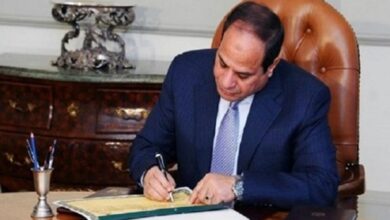The state-owned press gives prominent focus on Thursday to emerging details on the upcoming parliamentary elections. Safwat al-Sherif, the National Democratic Party’s powerful secretary general, gives comments emphasizing a number of potential changes in the voting procedures that he says will ensure a smooth, legitimate and transparent process.
The Supreme Council for Elections, which al-Sherif assures us is completely independent from the ruling party, is considering a number of recommendations from Egypt’s opposition parties. The council emphasizes that the NDP had also signed on to many of those opposition recommendations.
Al-Sherif, according to Al-Ahram’s front page story, is inviting opposition forces to participate in the great Egyptian democratic experiment. But al-Sherif also makes it clear that one of the most important cornerstones of modern Egyptian democracy is a firm separation between politics and religion.
Al-Ahram quotes al-Sherif as saying that one of greatest modern dangers to the process is, “mixing religion and politics, or using religious sources…or differentiating between people based on religion or gender or background.”
Reading between the lines a bit, al-Sherif’s comments to reporters seem designed to target (without actually mentioning them) two of the primary regime opponents: Mohamed ElBaradei and the Muslim Brotherhood. Al-Sherif’s promises of internal electoral reform and open invitation for full opposition participation seem aimed at countering ElBaradei’s call for a blanket opposition boycott of the upcoming elections.
And some of the reforms being considered, such as enabling voters to registers immediately using only their national ID cards, are lifted straight from the ElBaradei list of demands.
Meanwhile, the extended comments about the dangers of mixing politics and religion are merely a continuation of the regime’s long-standing contention that the Brotherhood are a huge threat to both Egypt’s democracy and its national unity.
Al-Sherif wraps up his comments, according to an article in the state-owned Al-Gomhorriya, by “emphasizing the right of civil society organizations and media institutions to monitor the elections.”
But this statement doesn’t make clear where monitoring will be permitted. Among the core demands of ElBaradei–and most other local activists–is that the polling places themselves be open to both local and international election monitors. Without that kind of access, al-Sherif’s words ring a little hollow as he’s basically inviting these groups to monitor elections from around the block.
Independent daily Al-Shorouk devotes part of its front page to a cabinet study on whether to create on independent authority to oversee new development in the Sinai Peninsula. Minister of Irrigation Mohamed Nasr Eddin Allam told the newspaper that the new administrative body under consideration would be responsible for “comprehensive planning for the development and improvement of the economic and societal conditions of the Sinai Bedouins.”
Allam also speaks of his ministry’s plans to begin digging dozens of new freshwater wells in Sinai and building an undisclosed number of water tanks to store clean drinking water for Bedouin communities.
Al-Shorouk also brings us front-page news of the latest recorded message from Egyptian born Al-Qaeda deputy Ayman al-Zawahiri. This time, in addition to the usual targets, al-Zawahiri focuses on ElBaradei’s reform campaign–a movement he essentially dismisses as another American-backed play for control of the Muslim world.
“ElBaradei, the secularist, fell from the heaven of American care to direct the Egyptian opposition,” al-Zawahiri states, according to Al-Shorouk. Al-Zawahiri also devotes a large part of his 44-minute statement to harsh condemnations of the Pakistani government and ruling class–which he says is already exploiting that country’s recent devastating floods for political and economic gain.
Al-Dostour, meanwhile, devotes front-page space to what it says will be a comprehensive evaluation by President Mubarak of Prime Minister Ahmed Nazif’s term in office. Quoting anonymous “senior officials,” the Al-Dostour story says Mubarak will soon convene a pair of cabinet sessions to evaluate “the commitment of the government to implementing the presidential program and its various projects.”
The article makes it clear that Nazif’s personal performance as prime minister will be one subject under scrutiny, but it doesn’t really give the impression that Nazif’s position at the head of Mubarak’s government is in imminent jeopardy.
Egypt's papers:
Al-Ahram: Daily, state-run, largest distribution in Egypt
Al-Akhbar: Daily, state-run, second to Al-Ahram in institutional size
Al-Gomhorriya: Daily, state-run
Rose el-Youssef: Daily, state-run, close to the National Democratic Party's Policies Secretariat
Al-Dostour: Daily, privately owned
Al-Shorouq: Daily, privately owned
Al-Wafd: Daily, published by the liberal Wafd Party
Al-Arabi: Weekly, published by the Arab Nasserist party
Youm7: Weekly, privately owned
Sawt el-Umma: Weekly, privately owned




